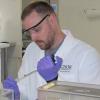So it looks like I might have an opportunity to do one of the above. IIRC, it takes 135 credits which are to include a handful of science classes to get started on an MD. I might need a few science classes or need to replace some of them as they are more than 5 years old, but that shouldn't take more than a semester or two to meet those requirements and I don't have anything holding me back, I'm free to commit the time to this as long as the job that results from it will be satisfying...
I'm not sure about the PharmD, and the PhD should be doable.
The PharmD appears to be 3-4 years shorter than getting an MD, but I'm not sure if it's right for me or how much I will be able to do with it for extending lifespans. I suppose I could get into drug development with it or start my own pharmacy and it would give me alot of respect and functional knowledge if I wanted to produce supplements. Down side is that I wouldn't be able to write scripts or be that longevity doctor everyone was looking for. I don't think I'd be aiming to be a retail pharmacist either. I'd definitely want to be involved in some other aspect of things, but I'm not sure what else there is to do besides work for a pharmacy or insurance company. What other doors open for PharmDs?
The PhD would be equally as doable, or slightly longer than the PharmD, though I could perhaps accelerate my progress with off season semesters. I would be able to contribute to virtually any field of science, but would still not be able be that longevity doctor everyone was looking for and employment as a PhD might be harder to obtain and perhaps less permanent than a PharmD or MD.
Then the MD would take me around 7-8 years before I could open my doors as that longevity doctor everyone wanted (I would only have ~5 years of support tops as things are now). However, if I could find a way to manage this, the MD would be more extensible. I could add a PhD with the money I would be making and add a specialty too. I could be that longevity doctor I was looking for.
Now, that said, I am 35, so I'd be pretty old by the time I finished any of this and the payback would be pretty limited unless we succeeded at radically extending lifespans etc... however I am looking at a fairly long lifespan, and I feel that if I was able to get some gene therapy along the way for the diseases of aging that my genetics tell me to expect, I might even be able to make it to aging escape velocity, though it is a long shot... though then again, I've met some pretty old docs in our movement who were still among the best and still working despite their age. The MD would leave me with the fewest barriers to life extension and rejuvenation. I would presumably be able to obtain Rx materials much more readily and have a much more hands on approach to my own personal care. I don't want to waste any time or get demotivated when things aren't what I thought they'd be, so any demystification anyone could offer would go miles for me.
So here's what I want to get out of my career in addition to the job:
- I want to be involved with the cutting edge medicine that will make us younger and fitter.
- Getting involved with gene therapy is of primary importance to me. I feel like I could do alot with it and I want control over and/or input regarding what methods are being researched and brought to market.
Is there anything I should look out for or which might be counter intuitive and make things take longer?
Anything I might want to know in advance? Tips etc?















































